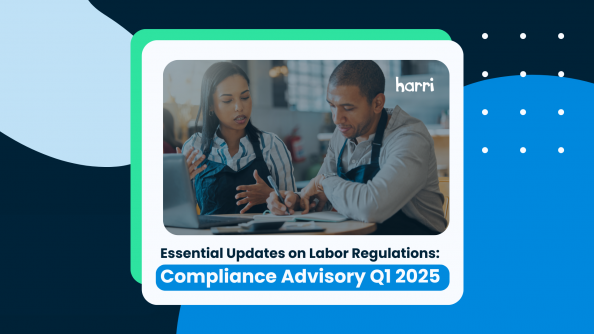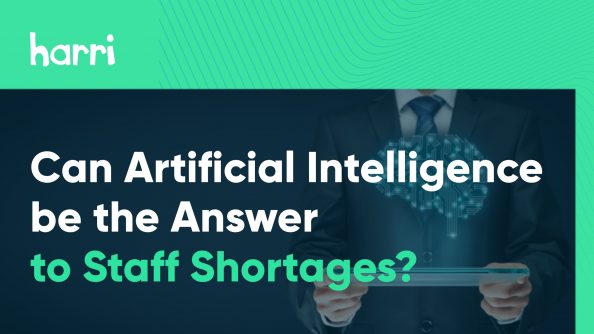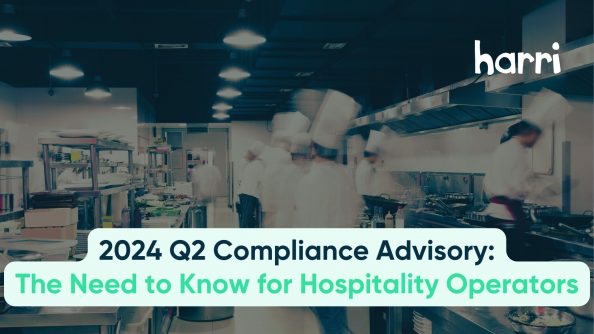Balancing AI Innovation and Employee Trust in Hospitality

- By Harri Insider Team | April 19, 2024
Fears of change are understandable given the lack of open and honest information about what AI is and its applications in everyday technologies. However, there is no need for concern, especially in the HR space. AI is not replacing roles; rather, it is gradually becoming a tool that can provide a competitive edge to hospitality brands and simplify tasks for everyone involved. Nevertheless, HR and hospitality professionals must balance AI innovation with the maintenance of employee trust.
There are numerous benefits to using artificial intelligence across various aspects of hospitality, particularly in HR and operations. Often referred to as a means to ‘automate mundane tasks,’ AI more accurately empowers teams to focus on more engaging and rewarding work. AI technology streamlines operations across several functions, including workforce management, payroll, and employee scheduling, making operations more efficient and reducing errors. This contributes to an enhanced employee experience, thereby increasing productivity among staff and allowing them to focus on higher-value activities.
Understanding Key Ethical Concerns with AI in Hospitality
Nonetheless, common ethical concerns associated with AI include:
- Data Privacy: How employee data is collected, stored, and used.
- Bias in AI: Potential for inherent biases in programming that could affect hiring and management.
- Transparency: Ensuring that AI processes are understandable to non-technical stakeholders.
While the potential benefits of leveraging AI in hospitality operations are significant, it is crucial for operators to understand the risks. For example, if a restaurant relies on a third-party AI system, such as a version of OpenAI’s ChatGPT, issues may arise if the restaurant does not fully comprehend or disclose how the AI provider uses or shares the collected data. Employees may start to question whether their information is being used solely for the intended purpose or if it’s being accessed by external entities for other uses.
This can lead to a myriad of negative consequences, beginning with the erosion of employee trust. Such mistrust can result in lower participation and a general sense of insecurity among staff. Additionally, legal and compliance risks may emerge. Depending on the jurisdiction, improper handling of personal data can lead to violations of privacy laws and regulations, potentially resulting in legal penalties and financial losses.
Maintain Transparency about the Use of AI
To navigate these challenges, it is essential for operators to maintain transparency about the use of AI. Focus on AI as a support tool, meant to empower employees to be more efficient. Emphasize that AI is used to augment, not replace, human capabilities. Showcase examples and case studies where AI has helped employees perform their jobs more efficiently, such as through automation of repetitive tasks, leaving more time for high-value activities that require human touch.
“Operators should be open about their use of AI, including what systems are implemented, how they work, and the purpose behind their use,” shared Dan Maimone, Global Director of Customer Success Operations at Harri. “Providing clear, understandable explanations about AI’s role in the organization helps demystify the technology and alleviate fears that AI might replace human jobs.”

Dan Maimone, Harri, speaks at the UK HR in Hospitality Conference during an AI in Hospitality breakout session in March 2024.
Involve Employees in the Process
Furthermore, involving employees in the AI implementation process can significantly boost their trust. This could be through initial consultations, trials, feedback sessions, and training programs. Allowing employees to voice their concerns and suggestions not only helps in refining the technology to better meet their needs but also strengthens their buy-in.
Provide comprehensive training to ensure employees are comfortable using AI tools. Understanding how to interact with new systems can empower employees and reduce anxiety around technology. Furthermore, education on the ethical aspects of AI can help them recognize the safeguards in place to protect their interests.
Consider how to incorporate feedback by establishing a continuous feedback loop where employees can report issues, suggest improvements, and share their experiences with AI. This ongoing dialogue can help operators quickly address potential problems and adapt AI applications to better serve the workforce. A tool like Harri Engage can make this process of gathering and analyzing employee feedback simple.

How to Use AI in hospitality
The number of potential use cases for AI in hospitality is unlimited, and many operators are already benefiting from integrating it into their daily operations. For example, AI streamlines the recruitment process by automating candidate screening and interview scheduling, which not only accelerates hiring cycles but also ensures a fair and unbiased selection process. A chatbot like Carri streamlines interactions with candidates, simplifying the process of asking questions and arranging interview times.
Post-hire, AI enhances employee satisfaction and retention through intelligent scheduling tools that consider both business requirements and individual employee preferences, promoting a better work-life balance. Additionally, AI aids in personalized training and development, offering tailored learning experiences and feedback mechanisms that help employees grow in their roles. Operational tasks such as shift management, payroll processing, and compliance tracking are also automated, allowing staff and managers to focus more on guest service and less on administrative duties.
Examples of AI Use Cases in Hospitality
Front-of-House Applications | Back-of-House Applications |
AI Chatbots for Customer Service | Inventory Management |
Smart Menus | Workforce Scheduling |
Personalized Marketing | Energy Management |
Voice-Activated Ordering Systems | Predictive Maintenance |
Dynamic Pricing | Food Safety Monitoring |
Facial Recognition for Loyalty Programs | Recipe Optimization |
AI-Powered Sommelier | Supply Chain Optimization |
Customer Feedback Analysis | Cost Control Analysis |
Queue Management Systems | Employee Training Platforms |
Event Management Assistance | Compliance Monitoring |
To effectively balance AI innovation with maintaining employee trust, it is crucial for operators to adhere to ethical AI use guidelines, ensuring all technologies are fair and unbiased, and rigorously audited to prevent biases. Operators must prioritize data privacy, transparently communicating what data is collected and how it is safeguarded, while complying with stringent data protection regulations like GDPR to reinforce trust among staff. Moreover, highlighting the tangible benefits of AI, such as enhanced job satisfaction, reduced workload, and improved work-life balance, can help employees see AI as a positive force, not meant to replace them but to empower them.
Harri’s Approach to Ethical AI in Hospitality
Harri’s approach to ethical AI emphasizes transparency, security, and responsible technology use to ensure the maintenance of employee trust and compliance with legal standards.
As a leader in Frontline Employee Experience technologies, Harri provides a comprehensive suite designed to optimize talent attraction, workforce management, and employee engagement. This enables organizations to effectively attract, manage, engage, and retain top talent, thereby revolutionizing the hiring experience and promoting a more efficient and satisfying workplace. Want to learn more?




















